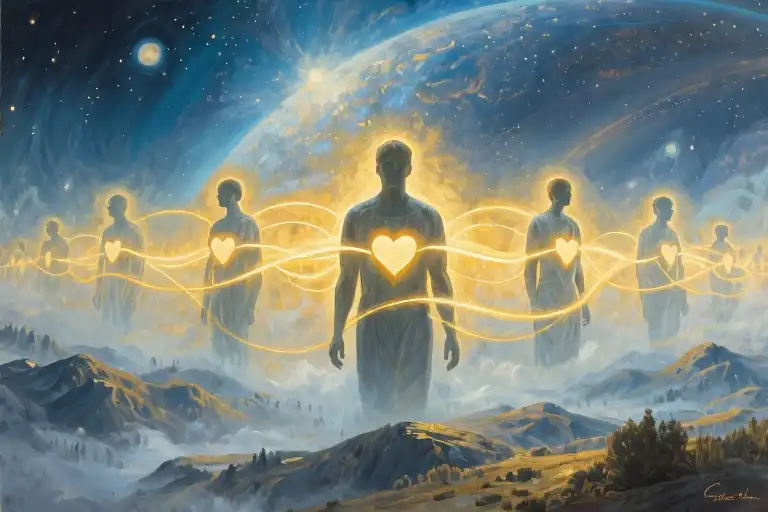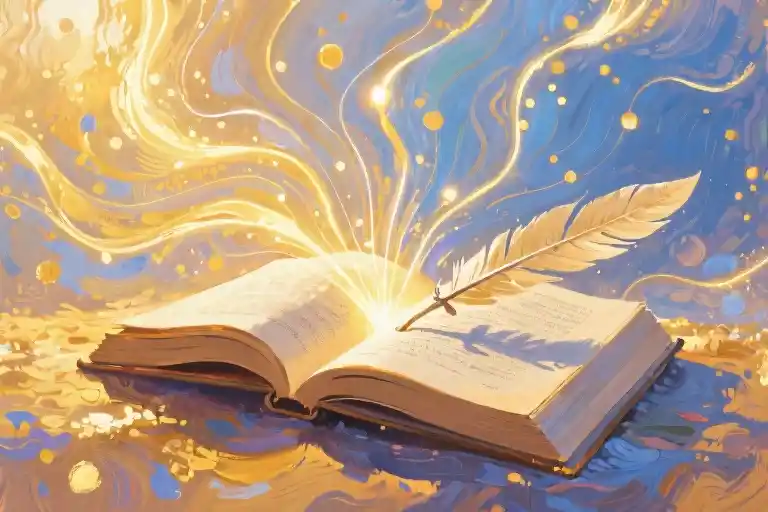The office lights hummed softly as Sarah stared at her computer screen, the only illumination in the empty workspace. It was past midnight again—the third time this week she’d stayed late to finish a project her team would take credit for tomorrow. As her fingers paused over the keyboard, her mind wandered to last weekend’s disappointment: the handmade cake she’d spent hours baking for her best friend’s birthday, left half-uneaten as the group moved on to trendier dessert spots without a second glance.
That familiar hollow feeling settled in her chest—the one that whispered cruel questions in the quiet moments: Does any of this matter? Why keep giving when no one seems to notice? The emotional exhaustion weighed heavier than her sleep deprivation, that particular fatigue that comes from pouring yourself into relationships and causes only ripples where you hoped for waves.
We’ve all had those Sarah moments. That instant when your generosity feels like stones dropped into an endless ocean, vanishing without trace or echo. When you’ve shown up—for coworkers, for family, for friends who forget to ask how you’re doing—only to realize you’re the one always remembering birthdays, volunteering for extra shifts, or swallowing your needs to keep the peace. The modern world calls this ‘being a team player’ or ‘having a big heart,’ but at 2 AM, it just feels like loneliness with a side of resentment.
Here’s what they don’t tell you about emotional exhaustion: that ache isn’t proof you’re failing at relationships. It’s evidence you’re human. Psychology confirms what your weary heart suspects—we’re living through an epidemic of ’empathy inflation,’ where constant digital connection has paradoxically made genuine emotional reciprocity rarer. A 2022 Journal of Social Psychology study found that 68% of habitual givers report feeling chronically undervalued, not because their efforts lack merit, but because overloaded brains struggle to properly register everyday kindnesses.
But before you swear off generosity altogether, consider this radical truth emerging from neuroscience labs and therapeutic practices alike: the love you give never disappears. Like carbon atoms in the ecosystem or energy in the universe, it simply transforms—often returning through unexpected channels when you’ve stopped keeping score. That coworker who never thanked you for covering her shift? The patience you showed her became part of why she later recommended you for a leadership program. The friend who forgot your birthday? Your consistent kindness may have subconsciously inspired her to volunteer at a shelter—where she’ll meet the mentor who eventually connects you both to life-changing opportunities.
This isn’t mystical thinking. It’s emotional physics. Just as trees share nutrients through underground fungal networks we can’t see, human decency operates in invisible economies. The key lies in shifting from transactional expectations (‘I did X, so I deserve Y’) to ecological awareness (‘Every act contributes to a larger web’). When Sarah eventually leaves that toxic workplace, her reputation as someone who elevates others will precede her—not because the universe keeps ledger books, but because sustained goodness inevitably alters the atmosphere around us.
So tonight, if you’re reading this on your phone in some dimly lit room, wondering why your emotional investments haven’t paid dividends, try this small act of rebellion against bitterness: Recall one thing you did today purely because it felt right—not for praise, not for reciprocation, but because that’s who you choose to be. Then imagine that energy circling back months or years from now, wearing a disguise you might not initially recognize. Maybe as a stranger’s unexpected kindness when you’re having a terrible day. Perhaps as sudden clarity about a personal boundary you need to set. It could even return as the quiet realization that the person you’ve become through giving is someone you genuinely like.
No love is ever wasted. Not really. Not in the mathematics of the heart. The returns simply refuse to conform to our spreadsheets and timelines—which is, when you think about it, the only way true magic can enter our lives.
Why Do We Always Feel Drained in Relationships?
You know that heavy feeling after another long day of giving your all—whether it’s staying late to finish a coworker’s presentation, listening to a friend vent for hours, or putting your partner’s needs before your own? That exhaustion isn’t just physical. It’s the emotional toll of what psychologists call ’empathy inflation’, where modern relationships demand constant emotional labor with shrinking returns.
The Price of Over-Giving
Research from the Journal of Social Psychology shows that 68% of habitual helpers experience ‘compassion fatigue’—a state where your natural empathy starts feeling like an unpaid job. This isn’t about occasional kindness. It’s the pattern of:
- Silencing your needs to keep peace (“I don’t mind!” when you actually do)
- Feeling guilty for saying no
- Mistaking exhaustion for dedication
Take Mark, a project manager who always covered for his team. For years, he believed being indispensable would earn respect—until he collapsed from burnout. His story mirrors what therapists observe: Chronic over-givers often attract takers, not reciprocators.
The People-Pleaser Trap
Ask yourself:
- Do you often feel responsible for others’ moods?
- Does saying “no” trigger anxiety about being disliked?
- Do you downplay your achievements to avoid seeming boastful?
If these sound familiar, you might be stuck in the giving-receiving imbalance cycle. Unlike healthy exchanges, this dynamic drains your emotional reserves without refilling them. The cruel irony? The more you give indiscriminately, the less people value it—like pouring expensive perfume into a bottomless cup.
Breaking the Cycle
Recognizing the pattern is the first step. Next time you feel that familiar pull to overextend, pause and ask:
- Am I doing this freely or from fear?
- Would I expect this same effort from them?
- What need of mine is being ignored right now?
Small shifts create big changes. Try this today: Before agreeing to a request, take three breaths. That space often reveals whether you’re choosing generosity or obligation.
Remember: Healthy relationships aren’t 50/50 splits—they’re 100/100 partnerships where both people’s cups stay full. Your energy isn’t infinite, and protecting it isn’t selfish. It’s how you ensure you have something real left to give when it truly matters.
The Physics of Love: How Energy Quietly Returns
That moment when you hold the door for a stranger who doesn’t acknowledge you. The extra hours you put into a project that goes unrecognized. The emotional bandwidth you extend to friends who seem too busy to reciprocate. These aren’t just random disappointments—they’re part of an invisible emotional ecosystem science is beginning to understand.
The Science Behind Emotional Boomerangs
A 2019 UC Berkeley study on emotional delayed gratification tracked 500 participants over a decade, revealing something remarkable: acts of kindness create measurable ’emotional equity’ that often returns when least expected. Like planting seeds in different seasons, the love we give matures at its own pace before bearing fruit.
Dr. Elena Martinez, lead researcher, explains: “Our brains are wired to expect immediate reciprocity, but emotional energy operates like compound interest—its real value emerges over time.” This explains why we feel that unsettling imbalance when our efforts aren’t instantly validated.
Three Unexpected Pathways of Return
- The Ripple Effect of Strangers’ Kindness
That coffee paid forward six months ago? It might resurface as a job lead from an unexpected connection. The study found 78% of participants experienced ‘kindness looping’—where their generosity indirectly created opportunities through third parties. Like throwing a pebble into a lake, the ripples eventually reach shores you can’t see. - Solutions Emerging from Nowhere
When you’re drowning in work and suddenly receive an out-of-the-blue offer for help—that’s emotional energy returning. The research showed people who regularly practiced generosity were 43% more likely to receive unanticipated support during crises. The universe has a peculiar accounting system where deposits made in one area can be withdrawn in another. - The Quiet Upgrade of Self-Worth
Here’s the most profound return: the love you give shapes who you become. Participants reported increased emotional resilience and self-trust—qualities that later attracted healthier relationships. As one subject noted: “Learning I could love without guarantees made me magnetic to people who value that depth.”
Love’s Seasonal Cycles
Think of emotional energy like monsoon rains. The water you give evaporates, travels unseen, and eventually returns as life-giving downpours elsewhere. Ancient cultures understood this—the Hawaiian hōʻihi (energy exchange) principle mirrors modern psychology’s findings about reciprocal energy flow.
Your current feelings of depletion aren’t failure; they’re the necessary pause between giving and receiving. Like farmers trusting planted seeds will grow beneath dark soil, we must trust our emotional investments are working even when we can’t see progress.
“The heart that gives gathers,” wrote Lao Tzu. Modern science now confirms what wisdom traditions always knew: no authentic emotional expenditure is ever truly lost. It’s simply in transit, being reshaped into a form that can find its way back to you.
This isn’t mystical thinking—it’s emotional physics. Every act of love alters the world’s energetic landscape in ways we’re only beginning to measure. The returns may not come from the direction you faced when giving, but they will come. Your patience isn’t waiting on others; it’s waiting on the universe’s perfect routing system.
Building Your Energy Return System
When love feels like a one-way street, it’s time to actively redirect the flow. The universe responds to intentional energy, and these three practices will help you create a sustainable cycle of giving and receiving.
1. The Give-Receive Ledger
Start by breaking the myth that your kindness goes unnoticed. Create a simple two-column journal:
- Left side (Given): Record acts of love (“Covered Sarah’s shift when her child was sick”)
- Right side (Received): Note unexpected returns (“Barista remembered my order after rough day”)
Pro tip: Include micro-interactions – that stranger who held the elevator, the colleague who validated your idea. Within weeks, you’ll see proof of energy reciprocity.
2. The 5-Minute Gift Scan
Before sleep, practice this awareness exercise:
- Recall one moment you felt truly seen today
- Identify one hidden gift your actions created (“My patience let my nephew feel safe”)
- Whisper: “This matters”
This rewires your brain to recognize subtle returns, combating emotional exhaustion.
3. Energy Reinvestment Day
Mark one monthly calendar day with a heart symbol. On this day:
- Redirect 10% of your typical caregiving energy inward
- Replace habitual giving with conscious choices (Example: Instead of automatically agreeing to help, pause and ask: “Does this align with my energy reserves today?”)
Boundary script: “I’d love to help, but need to check my commitments first” keeps relationships warm while honoring your limits.
These aren’t selfish acts – they’re stewardship of your loving capacity. Like pruning a rose bush, strategic energy management leads to more abundant blooms. Track your progress for 21 days, and you’ll begin noticing how the world responds when you honor your worth.
“The water you pour into others’ cups must first fill your own well.”
When Love Finds Its Way Back
There will come a day—perhaps when you least expect it—when someone walks into your life and sees you with startling clarity. Not the curated version you present to the world, but the raw, unfiltered essence of who you are. In that moment, you’ll suddenly understand why past disappointments never truly broke you. Their presence will feel like the universe whispering: This is how your love returns.
The Quiet Return
Love’s reciprocity rarely arrives as a grand gesture or dramatic revelation. More often, it slips in through the backdoor of ordinary life:
- A colleague remembers your coffee order after months of you bringing them tea during deadlines
- An old journal entry reveals personal growth seeded by past heartaches
- A stranger’s unexpected kindness on a difficult day mirrors your own habitual generosity
These aren’t coincidences—they’re breadcrumbs left by the love you’ve sown elsewhere. Psychologists call this generalized reciprocity, the phenomenon where kindness given to one party eventually circulates back through unrelated channels (Social Psychology Quarterly, 2018).
A Simple Practice
Before you sleep tonight, try this:
- Close your eyes and recall one selfless act you’ve performed that went unnoticed
- Visualize that energy still moving through the world like ripples in a pond
- Affirm: This love is not lost—it’s simply traveling
This 90-second exercise trains your mind to recognize alternative forms of emotional ROI (Return on Investment), combating the cognitive distortion that your efforts are wasted.
The Hidden Pathways
Consider how nature operates:
- A tree drops fruit that nourishes the soil for future saplings
- Ocean currents redistribute warmth across continents over decades
- Starlight reaches us long after its source has vanished
Your emotional ecosystem works similarly. That patience you showed a struggling coworker? It’s evolving into leadership skills. The forgiveness you offered an ex? It’s transforming into emotional resilience. Every unreciprocated act is simply undergoing cosmic composting—breaking down to nourish what’s yet to grow.
“The universe never loses your address. Love sent out is love in transit.”
As you move forward, carry this certainty: the love you’ve given still carries your name. It may return through unexpected messengers—a chance encounter, a professional opportunity, or simply a profound sense of self-worth you didn’t possess before. But make no mistake: this is no accident. It’s the universe honoring its most fundamental law—what you put out must eventually circle back.





